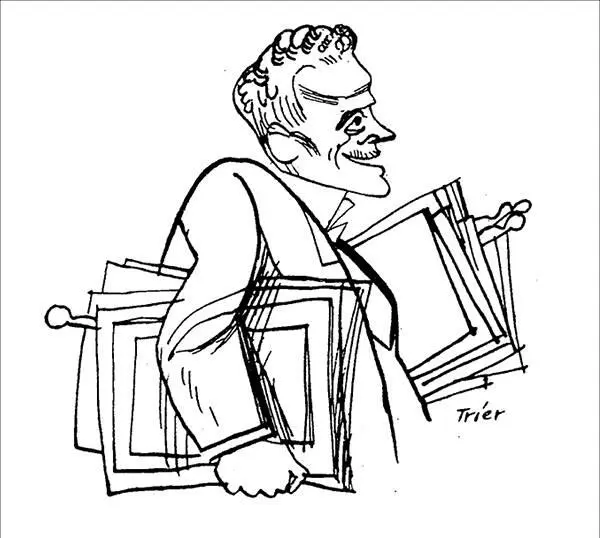The man, however, who suddenly crashed into the summery torpor of the barbershop — ginger blond, bull-necked, pugnacious — he talked the most.
No sooner had he slung his hat on the hook, as hard as if he wanted to tear it out of the wall, than he was tapping a half-lathered customer on the shoulder, bringing the barber’s assistant up short.
What the ginger-haired gentleman talked about was Hamburg.
Entirely without preamble he was off on Hamburg, as though his narrative was nothing but the continuation of a conversation begun on the street.
“The farther north you go, the more nationalist people are. In Hamburg they’re really excited about Flag Day. Well, you’ll see. It’s on its way. Can’t be stopped. On, on!”
His sentences grow ever shorter, he rattles subjects together, his words puff out their chests and march: one-two, one-two. It’s a nightmare.
And if you — I think — were to go south, or west, or east, it would be just the same. Whichever way you went you’d see people getting more nationalistic. Because what you see is blood.
The ginger-haired gentleman has killed off the summery singsong atmosphere in the barbershop with his crashing sentences. His voice rattles along like a yellow weathervane.
“Will you be joining us, Herr Trischke? Eh! When the time comes? Sure you will! Who wouldn’t? And it will come! Mark my words!”
His words rattle, clatter, and bang. Batteries, mortars, rifles, running fire, all come spewing out of his larynx. World wars slumber in his bosom.
Herr Trischke, the barber, would surely have lost a leg — at least! — if he hadn’t successfully lathered up the chops of the gentlemen on the General Staff. If war comes he won’t go.
But Herr Trischke is silent. Who isn’t? Even the fly, buzzing in so summery a fashion a moment ago, now adheres lifelessly to the ceiling, awestruck.
No one speaks, just him, the man. He touched rock bottom, but he didn’t rest; he worked and worked and worked till he had made his way back. He’s at the top of the tree now.
One morning not long ago his business partner came up to him and asked him for a loan. And in the afternoon? In the afternoon he was talking to his partner’s young wife, and she was wearing a diamond ring!
“You won’t catch my wife wearing any diamond ring!”
“My wife doesn’t own three summer hats! My sons don’t hang around in bars!” And if they did, by God — he would knock some sense into them! No matter how old they were! He would knock some sense into them!
He is strict with himself in order to be violent with others. He runs that he may whip others. He fries that others may broil. He wants war so that others may die. He gives up half his hard-earned fortune that others may work.
Oh, he’s not a victim of society, he’s its beneficiary. Socially and morally he is effective. He does the work of a hundred idle people. He’s the go-getting character out of the civics textbook. He puts nothing off till the morrow. His life is a hive of activity, chimney soot, drain smells, sander’s hum.
No motor rattle, no belt drive, no clatter of horses’ hooves. He is the trench digger, the wire cutter, the whetstone, the insect powder, the coffee machine, the guaranteed-infallible lighter, the dry fuse. Only:
He’s my friend from way back. He’s the aunt who scoured me every Saturday with a stiff brush. He’s the Kratzbürste. *
My neighbor was a glazier. His wife was a scold. He’s my glazier’s whining wife.
Our living room had a clock in it that used to clear its throat before striking the hours. He is that harrumphing.
My schoolmate was at the head of the class, and he had an impeccably neat notebook: The man in the barbershop is the neat notebook of my school friend; my school master’s class log; simultaneous equations; a book of logarithms!
He is my headmaster’s address at assembly; the kiss of my old-maid aunt; dinner with my guardian; an afternoon in an orphanage; a game of dominoes with my deaf grandfather.
He is duty and decency, sour-smelling and clean.
He isn’t a knave: He’s a navvy.
One does run into people like that, in our part of the world, even in midsummer. It feels like encountering a schoolbook in the middle of a suitcase packed for the beach.
And one lives with the idea of summery lassitude and inactivity in the world — green, quiet, almost extinct, the fly buzz, the silent moth flutter, sunshine (broken into bars), the gentle rasping sounds of a razor being stropped, the sleepy blades of the scissors, the soft plashing of soapy water, the tired sleepy chatter of the customers: morning at the barber’s, a fit subject for a Storm or a Mörike.
But if he weren’t alive, the man, this world would end — this world of whetstones, aunts, logarithm books, pecks on the cheek, knitting needles, school trips.
And of course the world mustn’t end!. .
Berliner Börsen-Courier, July 31, 1921
21. Richard Without a Kingdom (1923)
Richard the Red looks like a king in exile. All he needs is a Shakespeare to build a tragedy around him. He mooches and mopes around: the stuff of drama lacking a dramatist. He sits in other cafés and — oh woe! — is reduced to asking for a newspaper. Richard, formerly the absolute ruler over all printed words, domestic and foreign, turning to other newspaper waiters* for a paper. He, who so to speak enjoyed droit de seigneur, the right to deflower the newest editions, now receiving newspapers secondhand!. .
What?! Do you claim the world no longer knows who Richard is? Richard, the newspaper waiter in the Café des Westens? Richard, who wore his hunchback as a physical sign of intellectual distinction; the crookback as emblem of wisdom and romanticism. His physical defect had the effect of leveling class distinctions, and raised the waiter at least into the ranks of the straight-backed newspaper writers. In the Romanisches Café,* the adopted home of Berlin’s bohemians, there is a well-grown gazette waiter. He has all the papers, the Wiener Journal, the Prager Tagblatt, even the La Plata newspaper. But he doesn’t have a hunchback! My gaze slithers down his boring vertiginous back and finds nothing to catch on to. His collection is somehow incomplete. His existence as a literature bearer is not justified in every regard.

Red Richard. (sketch by Walter Trier)
Now, Red Richard was different! He had red hair. He was a special creation of the Almighty’s literary advisers, and selected as newspaper waiter by the PR boss in heaven. He has seen generations of writers come and go. Seen them wind up in prison or on ministerial chairs. Become revolutionaries and private secretaries. And all of them left owing him money. He knew what the future held for them, he knew the style of their writing, knew where their pieces had been reprinted, and kept them posted. Even as he told them, he handed them the paper — it was like getting the news still in its shell. And, if they were obscure or struggling — he helped them. In the glass-fronted cabinet at the Café des Westens hung, like syntheses in an experimental laboratory, the products of obscure living persons: a portrait, a poster for some reading or signing, copies of a new magazine that Richard hawked around among the clientele. Richard, in fact, was a patron of the arts.
In the afternoon, if things were quiet, Richard worked on his memoirs. Those memoirs were never completed. It would appear that Richard, who always had good taste, finally disdained to write his memoirs, after so many others had fatuously written theirs: It was not for him to be mentioned in the same breath as Ludendorff or Wilhelm.
Читать дальше













